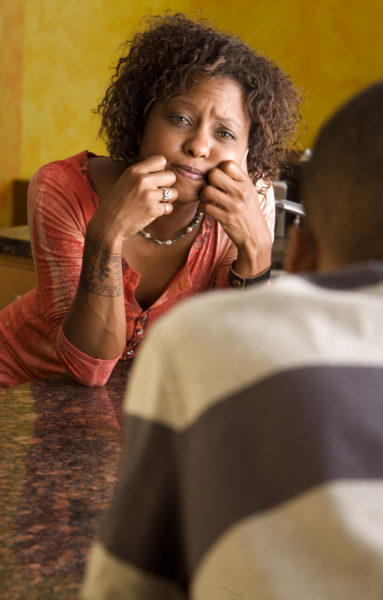Features
Winifred Adebayo: All the Hush About Sex in the Home Needs to Stop
 During my final year in primary school, an announcement was made for a ‘special class’ that would hold one day at the close of school. There were rumors that it was going to be the much dreaded-anticipated sex education. On this fateful Friday we were gathered, naïve and curious, about to be told the biggest ‘secret’ of life. We all saw the discomfort of our teachers as they took turns throwing blanket statements and ambiguous words on us. We left that class as ignorant as we walked in.
During my final year in primary school, an announcement was made for a ‘special class’ that would hold one day at the close of school. There were rumors that it was going to be the much dreaded-anticipated sex education. On this fateful Friday we were gathered, naïve and curious, about to be told the biggest ‘secret’ of life. We all saw the discomfort of our teachers as they took turns throwing blanket statements and ambiguous words on us. We left that class as ignorant as we walked in.
A few years later, in junior secondary school, one of our teachers was our scape goat and forced to give a sex-talk. She was supposed to teach us about the reproductive system. While she fought to keep the conversation strictly ‘biological’, it seemed that a good number of students found someone safe to talk to; questions were thrown at her.
“You said an egg is released every month; do girls lay egg and can we boil it?” one of my classmates asked. Another was experiencing an epiphany because he had just heard ‘wet dreams’ for the first time; a word that finally described the strange occurrence when he woke up one morning. Some girls were stylishly asking questions to alleviate their fears including one that thought sperm might be swimming around in her stomach waiting for her first ovulation to get her pregnant. Ignorance was the order of the day. While it may sound funny as I recount it, the dangers of the consequences of this silence around sex in the home are not funny.
It’s no news that a lot of parents and guardians still struggle with discussing sex with their young ones. Products of a different generation and time, there’s a significant struggle reconciling experiences with expectations. Most sex-talks given at home are usually very vague. In senior secondary school, a few of us girls gathered to talk, when some shared what they had been told about sex from their mothers, elder sisters or aunties. It was always during menarche, filled ambiguous words, and fear, with a stamp saying “run away from men”. My favorite from was someone’s mother who said “If any man comes close to you and even touches your hand, you’ll get pregnant”.
Silence around sex in the home has created a big gap. This has allowed most knowledge about sex to be gotten outside the home from friends, television, magazines, school teachers, etc. leaving no room for continuous dialogue and open line of communication when questions arise. Most times the information coming from outside either comes too late when there’s some form of trouble or is distorted and incomplete based on the sentiments of the source, giving room to predators.
I stumbled over a supposed children-show and I held my chest at the sexual explicit content of the conversation the actors were having. I soon realized that sex has regular guest appearances on cartoons and children television stations. Sadly, children watch this and get their first knowledge of sex that is mostly distorted for viewing pleasure. Even if children are raised with no television, what happens when they get to school or other public gatherings and mix with other children from different homes?
The silence around sex is also one of the factors that promote child sexual abuse. While people learn about sex when they are already teenagers, most children sexual abuse occurs five or more years prior on the average between age 7- 13 years. It’s heartbreaking to hear a recount of sexual abuse; one of the most common quotes is ‘I didn’t know what was happening to me’. This ‘not-knowing’ is one of the reasons children fall prey, don’t report their abuse or succumb to threats. Aside from abuse, children grow devouring their environment. What they hear and see stirs curiosity and allows for experimentation with their bodies; most times ignorant of what exactly they are doing or the consequences.
Silence around sex is a luxury this present and future generations cannot afford. Look around you; billboards, pictures, books, television, radio, packets of food, everywhere, there is always something sexual. Sex sells everything. The only way to ensure children grow up well and safe is to educate them. We have to learn and know how to have comfortable sex-related conversations with our young ones and keep the communication line open for questions.
It’s a big-lie that if you discuss sex with a child, they will go and have sex. It’s like saying because you were taught biology you will end up in a science related profession. Fear and false stories don’t help matters either. In fact, ignorant people are prey to making mistakes because they don’t know any better. Having conversations about it at home arms children/teenagers with enough knowledge to make the right choices. Peradventure they make a mistake; they also have enough knowledge to know what to do or come back and talk to you about it.
There’s a popular quote “different strokes for different folks”; I say “different methods for different generations”. To protect children, give them a rounded upbringing, and have the most positive effect in their lives, ALL THE HUSH AROUND SEX IN THE HOME NEEDS TO STOP.
Dear parents, sisters, brothers, aunties, uncles, etc., if you don’t talk to them, someone else will and that person might not be as loving as you.
Photo Credit: Dreamstime | Scott Griessel





















